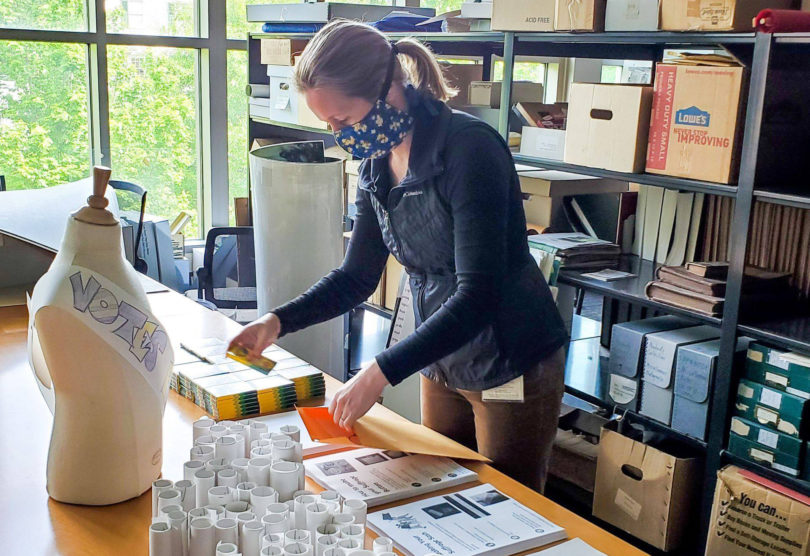At home in Decatur during a global pandemic, Jordan DeLaney wondered if her research project would have to be put on hold.
But even when the University of Georgia campus was closed, librarians were working from home to make sure students like DeLaney could find the information they needed. So DeLaney, who was exploring traumatic events on college campuses for an undergraduate research project, got all the help she needed by consulting librarian Sandra Riggs via email and Zoom sessions.
“She covered everything — she had information that I didn’t know it existed,” said DeLaney, a rising senior majoring in biology and minoring in public health whose project with the Division of Academic Enhancement’s Wendy Biddle is being incorporated in to an upcoming course on community well-being.
DeLaney began one-on-one consultations with Riggs in the spring prior to the closure of campus, and she said she is thankful she was able to continue that process virtually from home, finding digitized news articles, journals and e-books to complete her project.
“I knew the power of technology and emailing. It’s different when you are face to face, but she was really proactive in helping me find other things and dig through the research. We shared our screens and really dug in to what I found,” she said. “It was a great experience.”
Throughout the pandemic, librarians and archivists worked from their home offices, patios or living rooms to build resources, field questions and provide consultations. Riggs, who is a subject specialist in psychology, usually works out of the Miller Learning Center. The building opened in 2003 as a collaboration with the Center for Teaching and Learning and Enterprise Information Technology Systems with a vision of being a digital library and instructional and study space, and the investments that the libraries have been making to digital resources in the two decades since then paid off tremendously this spring.
“In the 21st century, libraries are about so much more than books on shelves. Our librarians were able to quickly pivot our services to remain UGA’s gateway to knowledge using all of our electronic resources and services,” said Toby Graham, university librarian and associate provost.
“I am tremendously proud of the creativity, resilience and commitment that UGA Libraries employees have shown during the past several months,” he added. “We look forward to welcoming students back to our five public facilities, including the MLC, and three branches this fall, but we pledge to maintain digital services that allow our patrons to access information in ways that allow them to remain healthy and safe at home or on campus.”
At a time when students, faculty and staff relied heavily on UGA Libraries for access to knowledge, a partnership with HathiTrust enabled even more online discovery. In addition to the Libraries’ catalog of 400,000 full-text e-books, emergency access from the digital preservation consortium of 150 academic libraries allowed patrons to access to another 2 million titles.
In three months, the libraries have supported access to about 600,000 full-text article downloads and about 776,000 database searches. In addition to filling requests for electronic articles via interlibrary loan and helping match faculty and students with online resources when print ones weren’t available, the libraries staff has acquired new digital content during the pandemic, including video and e-books, with a focus on materials needed to facilitate online instruction.
Instructional support and more
When Hilda Kurtz transitioned her urban geography course to online instruction in March, she decided to reconfigure one of her class assignments to help her students understand the course material in relation to the topic at the forefront of their minds — a community health crisis.
A former Libraries’ Special Collections Fellow, Kurtz reached out to archivist Mazie Bowen to find some historical materials that could help students learn from past experiences and see how cities reacted to past outbreaks. Within three days, Bowen provided dozens of digitized materials related to yellow fever epidemics in the late 1800s.
“Geographers have a lot we can offer to help people make sense of the situation that we find ourselves in,” Kurtz said. “I wanted my students to understand that people have been going through this before and we learned lessons from it. I think there’s a lot of value in looking at historical sources, and the beauty of the archives is it lets us get right down in the nitty gritty.”
Kurtz, the head of the geography department, said the log books, pamphlets and other materials that were digitized from the Libraries’ special collections vault provided an intriguing take on how people responded to illnesses in cities and how it impacted other geographic areas, even at a time when scientists had not yet uncovered that the transmission of yellow fever was linked to mosquitos.
“I think it will make a meaningful impact on how my students understand the COVID epidemic — and urban geography,” she said, explaining, “To understand cities, you don’t just look at cities, you look at urban systems. The archival materials brought to the fore how cities act in relation to one another — with yellow fever, for example, what happens in Louisiana affects what happens in Memphis and what happens upriver in Cincinnati. This research really highlighted that.”
Kurtz plans to incorporate the lesson into her course this fall semester, when her students may get the opportunity to interact with the materials in person at the Special Collections Building on campus.
In addition to instruction consultations, research help and digitization, special collections archivists and staff continued their work through the pandemic to share their collections with the community through virtual tours and events. And Libraries’ faculty and staff engaged in a number of other activities to help UGA and the community through the pandemic.
In April, the Science Library’s Makerspace was set up as a 3D printing hub, using its own equipment and several other 3D printers on loan from other departments to contribute more than 500 face shield bands toward the university’s PPE production effort.
The Libraries also answered a call for help by the Disability Resource Center, standing up an emergency service to caption video lectures for newly online courses, and staff and student employees whose duties didn’t lend themselves to telework were able to make a huge dent on a backlog of materials for the Walter J. Brown Media Archive and Peabody Awards Collection, completing cataloging work in two months that normally would have taken two years.
And the UGA Press and Georgia Review offered content digitally that was used by educators from Athens to Israel.
Reopening yet remaining online
Libraries’ faculty and staff are preparing to return to full in-person services in the fall. The first phase of the reopening plan begins June 23, when graduate students and faculty may pick up certain print materials that are not available online via a contactless porch service at the Main Library on North Campus.
Yet even as preparations are underway to open study spaces and offer technology lending and other services in the fall, librarians and archivists remain committed to students and faculty engaging in learning during the summer, such as Hamed Yaghoobian, a fourth-year doctoral student in computer science who is preparing to take his comprehensive exams.
“I miss going to the Science Library for research, and sometimes going to the Main Library to get movies from the media desk or to visit the DigiLab,” Yaghoobian said. “I miss my friends; the contact and the conversations, I miss them. But I can still get what I need.”
As a graduate student, Yaghoobian has long been a reader of digital academic journals through the UGA Libraries’ subscriptions, and he said he’s been able to find e-books to continue his research.
He’s grateful that the Libraries will allow graduate students and faculty to access some books through porch pickup this summer and that in-person services will resume in the fall. But Yaghoobian admits that he’s still a little nervous about returning to campus, so he plans to take advantage of the digital resources through the fall too.
“Throughout this time, you really realize the importance of advocacy for public information. It was such a big help to have access to open resources and the subscriptions,” he said. “It’s such a blessing.”







